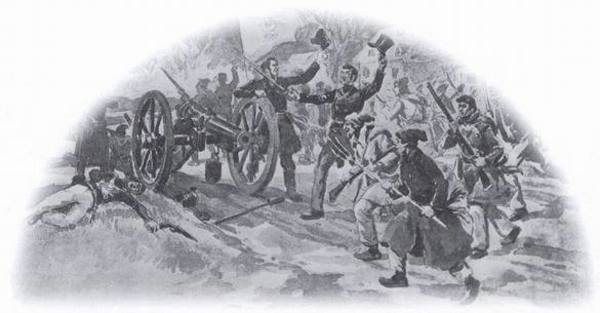The Patriote Rebellions (1837–38): “I was of
your number”

Source: Link
Like many others, George-Étienne CARTIER went from words to deeds:
“During the autumn of 1837, when the situation worsened in Lower Canada and rumbles of revolution were heard in assemblies [see Louis-Joseph Papineau], Cartier took part in the events in circumstances which, although unclear, enable us to situate him among those called Patriotes.”
The following extract from the biography of Charles Stephen GORE, an officer in the British army, describes Cartier’s participation in the battle of Saint-Denis on 23 Nov. 1837:
“Although his own strength did not exceed 300, Gore attacked. By 3 p.m., however, his infantry had been outgunned, his howitzer had proved useless, ammunition was in perilously short supply, rations were non‑existent, and he had suffered some 22 casualties. Moreover, George‑Étienne
After having lost battles in 1837, the Patriotes were routed. Some were arrested. Others, such as Cartier, went into hiding and then escaped:
“After the Patriotes’ defeat at Saint-Charles [25 Nov. 1837], Cartier, who had remained at Saint-Denis, had to hide, with his cousin Henry Cartier, at Verchères, where he spent the winter with a farmer. His death was announced in the papers, but in reality he had to flee to the United States after his hiding place was discovered. He lived at Plattsburgh and Burlington (Vermont) from May to October 1838.”
In the autumn of 1838, even before the end of the rebellions, Cartier attempted to distance himself from the Patriote movement, to put his participation in the events into context, and to make honourable amends to the British authorities:
“[Cartier’s] participation in the 1837 disturbances did not seem to him a gesture against England, even if he took pleasure in recalling with a smile that he had been a ‘rebel’; he claimed that it was, rather, a youthful escapade in which, as he wrote on 20 Sept. 1838 to Charles
“A proclamation of 9 Oct. 1838 annulled Durham’s ordinance, by which on the preceding 28 June Cartier had been included among those accused of treason. He then returned to Montreal and took the authorities to witness that his conduct was ‘the most pacific and the most irreproachable.’”
In 1844, back in Saint-Denis, Cartier would explain his participation in the rebellions:
“It was, [Cartier] said, against an oppressive minority rather than against the crown that he had fought…: ‘There is no longer any danger of a return to the events of 1837, caused by the actions of a minority which desired to dominate the majority and exploit the government in its own interests. The events of 1837 have been badly interpreted. The object of the people was rather to reduce this oppressive minority to nothingness than to bring about a separation of the province from the mother-country.’”
In the same speech, he would declare:
“‘I was of your number, and I do not think I showed lack of courage.’”
To learn more about the political context of the Patriote rebellions of 1837–38, the battles, and the reaction of the British authorities, we invite you to explore the following lists of biographies:





